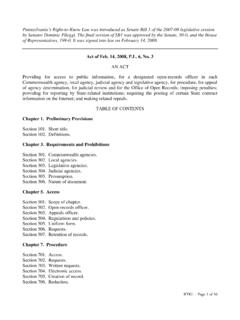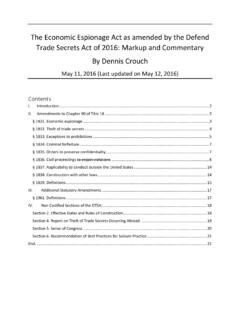Transcription of Trade Secrets and Confidential Proprietary Information
1 Trade Secrets and Confidential Proprietary Information Updated September 4, 2018. The Right-to-Know Law, 65 , et seq. ( RTKL ), includes specific provisions which come into play when a request seeks records involving Trade Secrets and Confidential Proprietary Information that have been provided to an agency by a third party. The Office of Open Records ( OOR ) developed this guide to help agencies handle such requests appropriately. The RTKL requires an agency to notify a third party when a request meets both of the following conditions (see 65 (b)): The third party provided the record(s) to the agency; and The third party included a written statement signed by a representative of the third party stating that the record contains a Trade secret or Confidential Proprietary Information . Providing notice to a third party and receiving input from the third party After receiving such a request, the agency should within five business days invoke a 30.
2 Calendar day extension for responding to the request and notify the requester of the extension (see 65 ). Also within five business days of receiving the request, the agency must provide notice to the third party. (While this section of the law does not specifically require that the notice be in writing, the OOR strongly recommends that the notice be in writing.). Once the notification is received by the third party, it has five business days to provide input to the agency regarding the release of the record. Within ten business days from the date the agency provided notice to the third party, the agency must either grant or deny access to the record (in whole or in part). This is done in writing to the requester in the same way as any other grant or denial under the RTKL. The agency should also send the third party a copy of the response.
3 What constitutes a Trade secret or Confidential Proprietary Information The mere fact that a third party declares a record (or a portion of a record) to be a Trade secret or Confidential Proprietary Information does not necessarily make it so. The RTKL includes specific definitions for Confidential Proprietary Information and Trade secret : Confidential Proprietary Information . Commercial or financial Information received by an Agency: 1. which is privileged or Confidential ; and 2. the disclosure of which would cause substantial harm to the competitive position of the person that submitted the Information . Trade secret. Information , including a formula, drawing, pattern, compilation, including a customer list, program, device, method, technique or process that: 1. derives independent economic value, actual or potential, from not being generally known to and not being readily ascertainable by proper means by other persons who can obtain economic value from its disclosure or use; and 2.
4 Is the subject of efforts that are reasonable under the circumstances to maintain its secrecy. The term includes data processing software obtained by an Agency under a licensing agreement prohibiting disclosure. 65 See, , Commonwealth v. Eiseman, 85 1117, 1128 (Pa. Commw. Ct. 2014) (interpreting the term Confidential Proprietary Information as defined in the RTKL), rev'd in part, Pa. Dep't of Pub. Welfare v. Eiseman, 125 19 (Pa. 2015); Crum v. Bridgestone/Firestone N. Amer. Tire, 907 578 (Pa. Super. Ct. 2006) (adopting the Trade secret standard from Restatement (Second) of Torts 757 (1965)). While any input received from a third party should be considered, an agency is not prohibited from releasing a record solely because a third party has recommended that the agency deny access. The RTKL envisions agencies independently evaluating such claims before deciding whether to release or withhold a record that may constitute a Trade secret or Confidential Proprietary Information .
















